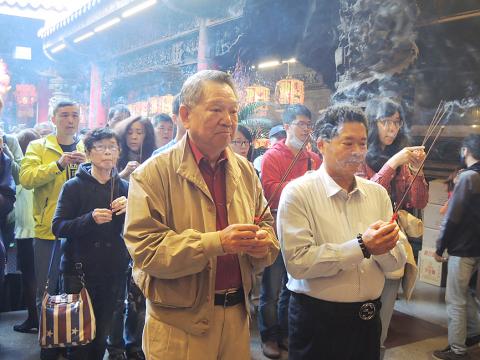The Jenn Lann Temple (鎮瀾宮) in Taichung’s Dajia District (大甲) yesterday became a hot spot for political campaigning by a couple of contenders for the Chinese Nationalist Party (KMT) chairmanship, as they laid out their plans for the party during their visits to the nation’s most famous Matsu temple.
Accompanied by temple vice chairman Cheng Ming-kun (鄭銘坤), former KMT vice chairman Steve Chan (詹啟賢) arrived at 9am to pay homage to the goddess of the sea.
The KMT needs a leader with corporate experience as it weathers difficult times, Chan said, outlining how he helped Chi Mei Medical Center and vaccine maker Adimmune Corp (國光生技) get back on their feet when he led the two companies.

Photo: CNA
“Different challenges will surface at different stages and they have to be dealt with by different people. The most important tasks for the KMT right now are crisis management and making it more in-sync with society for it to regain the public’s support,” Chan said.
If he were elected party chairman on May 20, he would work toward representing the party in the 2020 presidential election, Chan said, adding that he would be willing to take a backseat should a better candidate emerge.
Having served as minister of the now-defunct department of health and policy adviser to former president Chen Shui-bian (陳水扁), Chan resigned as KMT vice chairman earlier this month, reportedly due to his disapproval of KMT Chairwoman Hung Hsiu-chu’s (洪秀柱) handling of the thorny party assets issue.
Hours later, KMT Vice Chairman and former Taipei mayor Hau Lung-bin (郝龍斌) arrived at the temple, accompanied by several high-profile politicians, including former Taichung mayor Jason Hu (胡志強), temple chairman Yen Ching-piao (顏清標), and scores of Taichung city councilors and local borough wardens.
Hau said he would not run for the presidency in 2020 if elected KMT chairman and would respect different opinions.
Hau said he intends to move the party toward collective leadership, facilitate integration between the KMT’s legislative caucus and local city and county council caucuses, and push for a generational change in the party.
“The most important goal is for the party to regain power and ensure its victory in the 2018 local elections and the 2020 presidential race,” Hau said.

CHAOS: Iranians took to the streets playing celebratory music after reports of Khamenei’s death on Saturday, while mourners also gathered in Tehran yesterday Iranian Supreme Leader Ayatollah Ali Khamenei was killed in a major attack on Iran launched by Israel and the US, throwing the future of the Islamic republic into doubt and raising the risk of regional instability. Iranian state television and the state-run IRNA news agency announced the 86-year-old’s death early yesterday. US President Donald Trump said it gave Iranians their “greatest chance” to “take back” their country. The announcements came after a joint US and Israeli aerial bombardment that targeted Iranian military and governmental sites. Trump said the “heavy and pinpoint bombing” would continue through the week or as long

TRUST: The KMT said it respected the US’ timing and considerations, and hoped it would continue to honor its commitments to helping Taiwan bolster its defenses and deterrence US President Donald Trump is delaying a multibillion-dollar arms sale to Taiwan to ensure his visit to Beijing is successful, a New York Times report said. The weapons sales package has stalled in the US Department of State, the report said, citing US officials it did not identify. The White House has told agencies not to push forward ahead of Trump’s meeting with Chinese President Xi Jinping (習近平), it said. The two last month held a phone call to discuss trade and geopolitical flashpoints ahead of the summit. Xi raised the Taiwan issue and urged the US to handle arms sales to

BIG SPENDERS: Foreign investors bought the most Taiwan equities since 2005, signaling confidence that an AI boom would continue to benefit chipmakers Taiwan Semiconductor Manufacturing Co’s (TSMC, 台積電) market capitalization swelled to US$2 trillion for the first time following a 4.25 percent rally in its American depositary receipts (ADR) overnight, putting the world’s biggest contract chipmaker sixth on the list of the world’s biggest companies by market capitalization, just behind Amazon.com Inc. The site CompaniesMarketcap.com ranked TSMC ahead of Saudi Aramco and Meta Platforms Inc. The Taiwanese company’s ADRs on Tuesday surged to US$385.75 on the New York Stock Exchange, as strong demand for artificial intelligence (AI) applications led to chip supply constraints and boost revenue growth to record-breaking levels. Each TSMC ADR represents

State-run CPC Corp, Taiwan (CPC, 台灣中油) yesterday said that it had confirmed on Saturday night with its liquefied natural gas (LNG) and crude oil suppliers that shipments are proceeding as scheduled and that domestic supplies remain unaffected. The CPC yesterday announced the gasoline and diesel prices will rise by NT$0.2 and NT$0.4 per liter, respectively, starting Monday, citing Middle East tensions and blizzards in the eastern United States. CPC also iterated it has been reducing the proportion of crude oil imports from the Middle East and diversifying its supply sources in the past few years in response to geopolitical risks, expanding